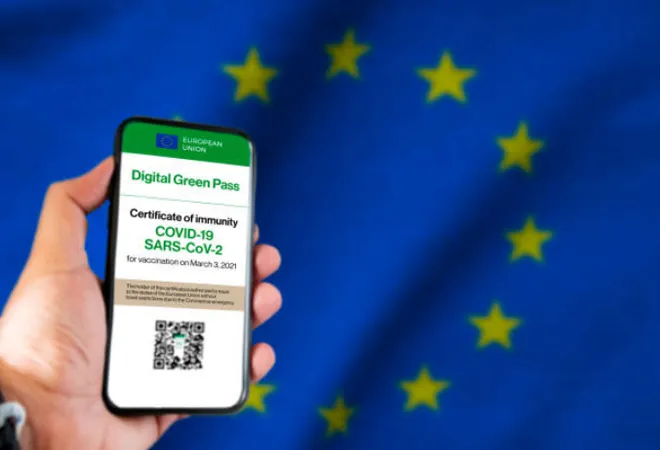
The EU (European Union) Digital COVID Certificate programme, which came into effect on July 1, relaxes travel restrictions for those who have been vaccinated with one of the four European Medicines Agency (EMA) approved vaccines. This includes Vaxzevria (Oxford-AstraZeneca), Comirnaty (Pfizer-BioNTech), Spikevax (Moderna), and Janssen (Johnson & Johnson). However, Indian-made vaccines—Covishield and Covaxin—are not on the list, since they have not been approved by the EMA. This was a surprise, particularly for Covishield, since it is the Oxford-AstraZeneca vaccine manufactured under license by the Serum Institute of India (SII), and is approved for emergency use by the World Health Organisation (WHO).
The green pass is not a precondition to travel, but exempts individuals from official border restrictions and quarantine requirements. These regulations vary from country to country and may include limitations on movement, mandatory quarantine procedures, and testing requirements. Such regulations can make travel cumbersome for those who have not taken any of the EMA-approved vaccines and can lead to significant financial, mental, and administrative repercussions.
This was a surprise, particularly for Covishield, since it is the Oxford-AstraZeneca vaccine manufactured under license by the Serum Institute of India (SII), and is approved for emergency use by the World Health Organisation (WHO).
India’s stand on vaccine passports
India has previously registered its opposition to a ‘vaccine passport’ stating that with low access to vaccines amongst developing countries, such a move would be highly discriminatory. When the EU green pass was announced, New Delhi visibly toughened its stand by declaring that it will only allow ease of travel from European countries that give reciprocal recognition to Covishield and Covaxin. The African Union (AU) also issued a statement arguing that the digital certificate programme promotes “inequalities”, and there is a danger that such inequalities could persist indefinitely. Since EU member states are free to design their own policies on recognising vaccines beyond the EMA list, Austria, Belgium, Germany, Ireland, Slovenia, Greece, Estonia, and Spain, as well as Schengen zone members Switzerland and Iceland, have given reciprocal recognition to Covishield.
The EU clarified that this situation arose because the SII had not applied for requisite permission from the EMA. It, moreover, asserted that there will be no automatic system for vaccine clearance; vaccines are biological products and need to be assessed through proper authorisation channels. However, this mechanism creates an artificial distinction between vaccines—even for those with a similar preparation, but different manufacturers. As of July 8, the COVAX facility—which aims to make COVID-19 vaccines available to lower-income countries—has shipped more than 95 million vaccines to 134 countries, and a vast majority of these vaccines have been Covishield. This poses tough questions on whether “all vaccines are treated equally”—and if they are not, then they can impinge on principles of equity, non-discrimination, and fairness. Going forward, such developments will only exacerbate the divide between those who have access to vaccines and those who do not.
It, moreover, asserted that there will be no automatic system for vaccine clearance; vaccines are biological products and need to be assessed through proper authorisation channels.
The debate on vaccine passports
Vaccine passports are not new, and have been utilised previously for proof of yellow fever vaccination, for travelling to certain destinations. With reference to COVID-19, vaccinations present the surest pathway for allowing a return to normalcy. Vaccine passes can ensure several health and economic benefits: They can encourage people to get vaccinated and allow a gradual reopening of the economy in the sectors of food, travel, and entertainment.
However, for a policy with such widespread international ramifications, a large number of legal, ethical, and practical considerations remain unaddressed. The biggest challenge comes from global inequity in vaccine access, manufacturing and distribution. According to recent data, 85 percent shots that have been administered so far have gone to the high- and upper middle- income countries, while only 0.3 percent doses have been administered to low income countries. The African continent has the slowest vaccination rate, and many African countries are yet to launch mass vaccination campaigns. It is estimated that the world’s poorest 92 countries will be only be able to reach a vaccination rate of 60 percent around 2023, or later.
As such, individuals from low- and middle- income countries are disproportionately likely to have their freedom of movement restricted, and could be subject to excess documentation and securitisation requirements. Since wealthy countries entered into advance purchase agreements with vaccine-makers and bought a disproportionate share of early doses, the rest of the world is still struggling to secure enough doses. A vaccine green pass would further entrench existing global inequalities, induce stratification, and is likely to cause friction between countries.
wealthy countries entered into advance purchase agreements with vaccine-makers and bought a disproportionate share of early doses, the rest of the world is still struggling to secure enough doses.
Moreover, digital vaccine passports are built on uncertain and evolving science. The WHO pointed out that there continue to be scientific unknowns regarding the effectiveness of COVID-19 vaccines, the duration of protection offered, and their efficacy in preventing disease and limiting transmission. With the rise of new variants, the efficacy of existing vaccines to effectively provide immunity against them also remains an unanswered question. There is also a concern that inequalities that arise now could be further accentuated in the future. If booster shots are deemed to be effective, it is likely that rich countries could offer booster shots before poorer and vulnerable countries, thereby, exacerbating this existing divide.
Proof of vaccine for travel can also skew domestic policy priorities: Preferential vaccinations for travellers could lead to inadequate supply of vaccines for priority populations. Additionally, privacy and data protection concerns need ample consideration: Who has access to information on COVID vaccination status, how is this sensitive data protected, and how will the data be used? Israel, one of the first countries to introduce a vaccine passport, uses the green pass to permit entry to hotels, gyms, restaurants, theatres, and music venues. Such restrictions can worsen discriminatory treatment for international travellers—particularly from low- and middle- income countries—and adversely affect their individual liberties. It is essential that future norms and policies need to ensure that data is securely stored, and that every use of data is consensual, safe, and transparent.
Israel, one of the first countries to introduce a vaccine passport, uses the green pass to permit entry to hotels, gyms, restaurants, theatres, and music venues.
Conclusion
WHO does not currently endorse proof of vaccination or immunity as a condition of entry for international travellers. However, in March, the WHO released the ‘Interim Guidance for a Smart Vaccine Certificate’, which stated that such certificates should be based on principles of equity, accessibility, privacy protection, scalability, and sustainability. These principles provide important guidance for framing ethical policies on ‘green passes’. Nonetheless, for a policy that can impact hundreds of thousands of people across the world, it is necessary that it is based on scientific evidence, and must meet legal standards of equality, non-discrimination, and privacy. Inequitable distribution of vaccines has deepened existing inequalities, and can introduce new ones if they seek to privilege a few. Vaccines are a global public good, and as long as their distribution remains unequal, principles of comity and reciprocity need to be considered as countries frame policies on vaccine passports.
The views expressed above belong to the author(s). ORF research and analyses now available on Telegram! Click here to access our curated content — blogs, longforms and interviews.




 PREV
PREV


